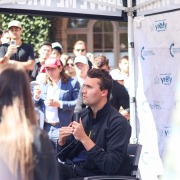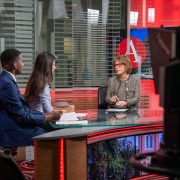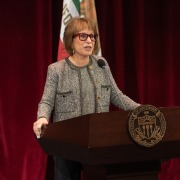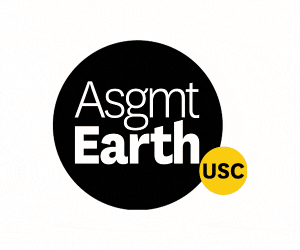ended
2024 USG presidential debate — as it happened
Last updated:
Read the article:
USG candidates debate for student votes
📌 PINNED | Last updated: February 13, 2024 9:37 p.m.
Nicholas Corral (now) & Max Rubenstein (earlier) from The Forum; Jonathan Park from the newsroom
Debate night is over after two and a half hours of speeches and arguments.
The Presidential Debate has now concluded.
This debate — moderated for the first time by a panel of USG chief justice Nivea Krishnan, Daily Trojan editor-in-chief Anjali Patel and Annenberg Media executive editor Tess Patton — featured the P/VP tickets of:
- Julianna Melendez and Klarissa Palacios
- Dacity and Abitha Nunis
- Sam Stack and Christian Shaw
- Bryan Fernandez and Brianna Sanchez
Senatorial candidates are as follows:
- Seva Raman and Mikaela Bautista
- Jeremiah Boisrond
- Dane Sprague and Veer Juneja
- Heydy Vasquez and Patrick Nguyen
- Akshay Manglani
- Jackalyn Karamanougian and Diana Carpio
- Brandon Tavakoli
- Elija Martice Barnes
Just a note of transparency: Some of the candidates that participated in the debates tonight have affiliations, or were previously affiliated, with the Daily Trojan. Heydy Vasquez is a columnist for Opinion. Dacity was previously the digital managing editor at the Daily Trojan, and Klarissa Palacios was previously a writer for Opinion. Last but not least, of course, our own editor-in-chief Anjali Patel will be among the moderators tonight. Neither Patel nor Vasquez are involved in our coverage of the debates; Dacity and Palacios are no longer affiliated with this paper.
10:16 p.m.
Nicholas Corral, USG Beat Writer
While the candidates agreed on most issues — repeating each other on issues of wellness and DEI — they distinguished themselves on a narrow range of issues: namely Greek life and student engagement.
Fernandez and Sanchez repeatedly stated their platform’s focus on achievable programs and creating continuity with the administration to follow them.
Stack and Shaw emphasized their passion for the job and their commitment to the student body and student government and Melendez and Palacios hit on issues with accessibility around campus.
Dacity and Nunis distinguished themselves on Greek life — being the only ones not involved in a fraternity or sorority. They described what they called structural issues in the system and called out the impact of the Greek vote on elections.
The senate race, meanwhile, remains an afterthought with fewer candidates running than senate seats.
9:46 p.m.
Jonathan Park, Digital Managing Editor
The Presidential Debate has now concluded, ending around two and a half hours of speeches, presentations, questions and answers that ultimately felt like an endless loop of repeating slogans and campaign values.
The Dacity-Nunis ticket stood out as the only candidates to not only not be involved in Greek life, but to be staunchly against its existence — but they stumbled on convincing the audience that their “outsider status” from USG could translate to an effective presidency.
The other tickets hit some points on RSOs — ever the popular buzzword throughout this debate — and student needs, but yielded no memorable moments.
9:40 p.m.
Nicholas Corral, USG Beat Writer
In closing statements, Melendez and Palacios reiterated a lack of trust in USG and highlighted their records as important in restoring that faith.
Stack and Shaw emphasized that they are there for students, not themselves.
“I just want to re-emphasize the fact that Christian and I care. We care about making a lasting difference on campus. We care about the interests and the needs of students,” Stack said.
Dacity and Nunis called for students to vote for change and highlighted their outsider status.
Fernandez and Sanchez again highlighted that their platform emphasizes realistic goals for the coming year within their roles.
9:32 p.m.
Nicholas Corral, USG Beat Writer
Vice president Michelle Lu asked where the candidates would improve transparency within the organization.
Fernandez and Sanchez said they would improve the Funding Department’s communication given Sanchez’s own difficulties in hearing from USG.
Stack and Shaw likewise praised the work of the Funding Department, but reiterated a need to improve the funding tracker and provide better workshops on funding for RSOs.
Melendez and Palacios described a need to expand vendor lists for RSOs to cut costs.
Dacity and Nunis likewise explained a need to expand vendor lists — specifically highlighting challenges of the East African Student Association to get the vendors they needed. They also endorsed the Karamanougian-Carpio ticket’s calls to break RSOs into multiple tiers.
9:28 p.m.
Nicholas Corral, USG Beat Writer
Jakatdar asked which initiatives of USG are currently successful and would be expanded under the candidates’ administration.
Dacity and Nunis praised the presence of some USG members at community events.
Melendez and Palacios referenced the Too Good To Go program under Campus Dining and the Committee on Affordability and Basic Needs.
Stack and Shaw described a focus on student wellness and highlighted the work of current administration on the medical supply vending machines.
Breaking from the group, Fernandez and Sanchez did not highlight a project of the current administration. Instead they praised the administration’s work to encourage interdepartmental collaboration.
9:20 p.m.
Nicholas Corral, USG Beat Writer
Candidates were asked how their administration will incorporate diversity, equity and inclusion.
Melendez and Palacios explained their desire to avoid any quota around DEI and a need to include all groups — specifically highlighting a lack of inclusion on disability.
Stack and Shaw highlighted the diversity of the USC campus and offered USG as an important forum for all students to express their concerns.
Fernandez and Sanchez described the cabinet as one of the most direct aspects a president or vice president can control.
Dacity and Nunis stated that diversity extends beyond USG and highlighted their platform’s call to remove culturally insensitive parts of campus.
The microphone has now been transferred to USG president Divya Jakatdar and vice president Michelle Lu to ask questions.
9:18 p.m.
Nicholas Corral, USG Beat Writer
Candidates were asked how they would encourage students to engage with USG given the organization’s abysmal record of student engagement.
Stack and Shaw described a need to create “fun” initiatives which would connect students to USG — specifically mentioning a pajama day.
Fernandez and Sanchez stated that many RSOs feel USG only approaches them during election season. They also stated that the senate could improve attendance by choosing issues relevant to RSOs.
Dacity and Nunis lamented what they called the bureaucracy of USG and said they wanted to focus on “uplifting voices rather than speaking for” students.
Melendez and Palacios stated a need to incentivize students to engage with USG by communicating with students about the progress about their concerns.
9:11 p.m.
Nicholas Corral, USG Beat Writer
Candidates were asked how their platform anticipates changing student needs given the unpredictable events year-to-year.
Melendez and Palacios reiterated their desire to connect with students and promoted a newsletter with video supplement to explain the functions of USG
Stack and Shaw also expressed the use of the USG newsletter as well as connecting with students where they are — including the use of social media.
Fernandez and Sanchez described the focus of their campaign on initiatives that are in progress or achievable.
Dacity and Nunis explained how connecting with RSOs would allow their programs would continue beyond their term.
9:06 p.m.
Nicholas Corral, USG Beat Writer
In a surprising turn, candidates were asked who their second choice will be under the newly introduced ranked-choice voting system.
Dacity and Nunis: Fernandez and Sanchez
Melendez and Palacios: Fernandez and Sanchez
Stack and Shaw: Melendez and Palacios
Fernandez and Sanchez: Stack and Shaw
9:00 p.m.
Nicholas Corral, USG Beat Writer
After an uncharacteristic question about how they would address gentrification, candidates were asked how they would prioritize student wellness. All candidates highlighted a need to connect students with resources to support mental health.
Stack highlighted his work to start the Men’s Mental Health Initiative. He said that work inspired him to acknowledge stigma around mental health and to better connect students to wellness resources.
Sanchez lamented what she said was a lack of information for students about wellness resources. She also promoted the ongoing Wellness Week, sponsored by USG.
While Melendez and Palacios acknowledged their platform does not specifically address mental health, they said they supported explaining resources to students during orientation programming, and also adding on more embedded therapists for different niches.
Dacity and Nunis described a live document that would explain resources. They also described a lack of connection with USG and cultural centers that provide resources.
8:55 p.m.
Nicholas Corral, USG Beat Writer
Candidates were asked on their stance on the Department of Public Safety’s relationship with the campus community and the surrounding South Central community.
Dacity and Nunis stated there is a disconnect between DPS and the communities they serve. They outlined a need for a line of communication between students and DPS and the community and DPS.
Melendez and Palacios described a meeting with international students who feared for their safety. They said they would educate themselves first before beginning a conversation
Stack and Shaw stated there has been a rise in crime around campus (we were not able to confirm this) and there is a need for students to work with DPS.
Fernandez and Sanchez expressed support for some reforms but did not name any specific changes.
“We recognize that DPS is not a perfect system,” Sanchez said. “And we also recognize that students do want to feel safe on campus.”
8:52 p.m.
Nicholas Corral, USG Beat Writer
Would you have done anything differently than the [current] administration and so how?
Palacios described a need to connect students with a wider range of resources including alumni.
The Fernandez-Sanchez and Stack-Shaw tickets praised the current administration and offered muted criticism of flaws.
Dacity and Nunis highlighted their outsider status and criticized a lack of change within USG.
“A lot of organizations are sometimes successful — not because of USG, but despite it,” Dacity said.
8:50 p.m.
Nicholas Corral, USG Beat Writer & Jonathan Park, Digital Managing Editor
The question: How do you think USG and the University as a whole should balance freedom of speech and expression with student safety as outlined in the University Code of Conduct?
It was a question that hinted at, but avoided explicit mention of, Israel’s war in Gaza and its ramifications on college campuses across the U.S. Perhaps following that example, candidates also gave avoidant answers, with the Fernandez-Sanchez and Melendez-Palacios tickets both giving an answer about needing to be proactive, and Melendez especially saying students’ concerns were pushed aside and communication with administrators was sparse.
Dacity and Nunis said that there needed to be a space for “productive dialogue” that does not create hate.
8:41 p.m.
Nicholas Corral, USG Beat Writer& Max Rubenstein, Assistant News Editor
What should USG’s relationship be with Greek life?
Stack and Shaw stated that it is insensitive to single out Greek life as a source of issues and feel the conversation has minimized sexual assault of men. They favor working with the UPIFC and USC Panhellenic Council.
Dacity and Nunis replied by, again, pointing out rates of sexual assault — including of men — within Greek life. They highlighted other RSOs on campus as well as structural issues within Greek life. Having more gay people or people of color in Greek life “doesn’t matter when the Greek life structure itself institutionally is having people get sexually assaulted, get hazed,” Dacity said, before being cut off for time.
Melendez and Palacios did not specify a problem but instead described a focus on resources available and listening. Palacios said that Greek life is a major source of housing and can be a source of community.
Fernandez and Sanchez stated that USG must represent all students regardless of their membership of any organizations.
“The way you talk about things with people, the way you address them and the way you make them feel is key to ensuring that students feel safe and they feel heard,” Fernandez said.
In response to an audience question, Dacity said that 30% of students are part of Greek life but suggested that the Greek vote has de facto control of USG. (We could not immediately verify that number.) Stack and Shaw reiterated that students in Greek life deserve a seat at the table as well.
8:31 p.m.
Nicholas Corral, USG Beat Writer; Jonathan Park, digital managing editor & Max Rubenstein, Assistant News Editor
The debate has now devolved into a round of trivia questions about USG and USC (“What are the three branches of USG?”). One wonders what any of this has to do with candidates’ platforms.
8:28 p.m.
Nicholas Corral, USG Beat Writer & Max Rubenstein, Assistant News Editor
The question: What is the most ambitious issue you will tackle if elected USG president?
Stack and Shaw described working with off-campus organizations to expand access to food.
Fernandez and Sanchez said they want to expand the current STI testing initiate as a continued line item in collaboration with the graduate student government
Dacity and Nunis outlined work to address Greek Life as their most ambitious initiative.
“Now that we have disaffiliated frats, they’re actively avoiding accountability,” Dacity said.
Palacios said they want to set USC as a “trailblazer in accessibility.” Palacios and Melendez highlighted their work in creating an Office of Student Accessibility Services workshop and accessibility training for professors and students.
8:24 p.m.
Nicholas Corral, USG Beat Writer & Max Rubenstein, Assistant News Editor
The question: What is the biggest issue on campus right now?
Melendez and Palacios described issues with a “transactional relationship” between recognized student organizations and USG.
Dacity and Nunis described the importance of basic needs as prerequisites to other USG priorities. They want to expand the pantry and support student organizations working to support basic needs
Stack and Shaw said the biggest issue was the pitting of students against one another, though they offered no specifics. They described improving meetings with RSOs and student assemblies.
Fernandez and Sanchez explained the importance of reaching out to students to ensure students are comfortable communicating with USG.
8:20 p.m.
Nicholas Corral, USG Beat Writer & Max Rubenstein, Assistant News Editor
The question: Why do you believe that you are the best ticket for president and vice president of USG?
Sanchez said her multiple roles within the legislative branch, while Fernandez said he had been involved in multiple organizations on campus. Melendez and Palacios also highlighted their long term involvement in USG.
Dacity and Nunis stated their intention to represent a diverse student body. “USG is funding students and the students are the ones going to work,” Dacity said. “We are here as a representative of students in their journeys, in their projects and their passion.”
8:11 p.m.
Nicholas Corral, USG Beat Writer & Max Rubenstein, Assistant News Editor
Candidates gave their opening statements:
Dacity and Nunis focused on student basic needs and removing offensive campus structures. The pair also declared their opposition to Greek life and support for divestment.
Melendez and Palacios asked students to imagine “A USG you can trust,” and described a platform focused on transparency and support for students.
Stack and Shaw emphasized their role within — rather than above — the student body. They described honing in on service as a focus.
Fernandez and Sanchez outlined their platform, described as C.A.R.E. — community, accessibility, representation and equity.
8:11 p.m.
Nicholas Corral, USG Beat Writer
The Presidential Debate begins.
The debate will consist of one minute opening statements, general questions which candidates will answer in 45 seconds, “quiz questions,” a section devoted to campus issues including student questions, and closing statements.
8:05 p.m.
Jonathan Park, digital managing editor
The Senatorial Forum is over.
It was a long hour of aesthetic presentations, quirky slogans, vague project proposals and buzzwords on buzzwords. Most, if not all, of the candidates acknowledged the frustrations RSOs and RSO candidates had with USG, each of them putting forth some solution involving increased transparency or a streamlined process.
We’ll be back after a short break for the Presidential Debate.
8:02 p.m.
Nicholas Corral, USG Beat Writer
Carpio and Karamanougian proposed a system of regular town hall meetings, providing resources for students to develop programs outside of USG and ensuring campus buildings comply with the Americans with Disabilities Act.
Carpio proposed revising the definition of Recognized Student Organizations to distinguish between organizations that need funding and those that need only spaces.
“We want to make sure that we’re connecting with students. That we’re advocating for things that are relevant to USC and relevant to what is the capacity of USG,” Carpio said.
7:55 p.m.
Nicholas Corral, USG Beat Writer
Manglani cited inequities within the University community as a motivation for his campaign. His platform calls for improved transparency in club recruitment procedures, financial literacy initiatives and reducing food waste by a system of food banks for individual students’ unused food.
7:47 p.m.
Nicholas Corral, USG Beat Writer
Bautista and Raman highlighted three pillars of their platform: transparency, including improving resources for students not covered by the USC Housing Guarantee; affordability, with initiatives like dining dollars rollover and a textbook resale market; and inclusion for communities like spring admits and collaboration between programming assemblies.
“In my experience, USC did a great job at providing these events for spring admits,” said Bautista, a sophomore majoring in business administration. “However I feel like spring admits weren’t able to take advantage of that opportunity.”
7:40 p.m.
Nicholas Corral, USG Beat Writer
Boisrond said a lack of transparency was a major issue for USG and proposed an improved resource page for students. His platform also includes reducing the cost of the USC meal plan and expansion of the Trojan Closet initiative.
“USG does have the power to be able to transform students’ lives for the better,” said Boisrond, a freshman majoring in legal studies. “We must be able to come together and be able to cultivate this environment.”
7:39 p.m.
Jonathan Park, digital managing editor
RSOs, RSOs, RSOs.
That seems to be the prevailing theme among candidates presenting their platforms, after a year marked by frustration among student organizations regarding funding transparency, and even getting recognized in the first place.
7:32 p.m.
Jonathan Park, digital managing editor
It seems as though this debate is really just a formality, and all the candidates will be elected.
7:31 p.m.
Nicholas Corral, USG Beat Writer
Vazquez and Nguyen expressed an intention to encourage more affordable events, like Trojan Family Weekend especially for out-of-state students, work on initiatives that promote inclusivity and create resources to support first-generation students. The pair stated that their platform was based on their experiences as advocacy liaisons within USG.
7:26 p.m.
Nicholas Corral, USG Beat Writer
Sprague, a junior majoring in economics as well as philosophy, named the unexpected recognized student organization application freeze as a major issue that removed student agency. In discussing USC as a part of the greater Los Angeles community, he encouraged the formation of RSOs with an outward focus specifically using the USG Legislative Fund.
“I think that RSOs are the lifeblood of USC,” Sprague said. “I met all my best friends through the Trojan Debate Society.”
7:18 p.m.
Nicholas Corral, USG Beat Writer
Tavakoli touted his work as a current USG senator to empower student voices through the Concerts Committee. His platform focuses on building programs for commuter students, enhancing RSO resources and improving the course registration experience.
“As we know, the process is really slow to get real substantive legislative change,” said Tavakoli, a junior majoring in business administration as well as public policy. “I just need another year to try to get on and make sure those projects come to fruition.”
7:12 p.m.
Nicholas Corral, USG Beat Writer
Barnes, a sophomore majoring in mechanical engineering, presented his platform focusing on financial aid, recognized student organization aid, community outreach and campus climate.
“My focus will be on the encouragement of [recognized student organizations] to reach out to the local USC area,” Barnes said. “So not only focusing on enriching the lives and experiences of students as they go to USC, but also making sure that they work with the community around USC.”
7:04 p.m.
Jonathan Park, digital managing editor
The Senatorial Debate begins.
“Debate” is perhaps loosely defined here; the candidates will present for four minutes followed by one minute of audience questions. Elija Martice Barnes is the first to present.
6:55 p.m.
Jonathan Park, digital managing editor
Just a note of transparency: Some of the candidates participating in the debates tonight have affiliations, or were previously affiliated, with the Daily Trojan.
Heydy Vasquez is a columnist for Opinion. Dacity was previously the digital managing editor at the Daily Trojan, and Klarissa Palacios was previously a writer for Opinion. Last but not least, of course, our own editor-in-chief Anjali Patel will be among the moderators tonight. Neither Patel nor Vasquez are involved in our coverage of the debates; Dacity and Palacios are no longer affiliated with this paper.
6:54 p.m.
Jonathan Park, digital managing editor
Senatorial candidates are as follows:
- Seva Raman and Mikaela Bautista
- Jeremiah Boisrond
- Dane Sprague and Veer Juneja
- Heydy Vasquez and Patrick Nguyen
- Akshay Manglani
- Jackalyn Karamanougian and Diana Carpio
- Brandon Tavakoli
- Elija Martice Barnes








